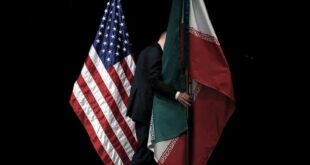 TEHRAN (FNA)- Iran’s Ambassador to Baghdad Hassan Kazemi Qomi said the US-Iraq security pact is a “pure Iraqi issue.”
TEHRAN (FNA)- Iran’s Ambassador to Baghdad Hassan Kazemi Qomi said the US-Iraq security pact is a “pure Iraqi issue.”
Speaking in an interview by the Los Angeles Times, he noted the security pact is one-sided and emphasized the US should respect Iraq’s internal affairs.
Iraqis regard the deal as being imposed on them and they would disagree with it since it damages their independence, sovereignty and civil rights, he said.
“Our advice to the Americans is as follows: before the anger of the Iraqi people regarding the occupation turns to violence, the Americans should logically solve this. They should pay attention to the sovereignty of Iraq and its culture and traditions. This is the sort of safety valve for maintaining the interests of all.”
Asked whether Iran “advises or speaks with the Iraqis” about the agreement, Qomi replied, “This is an Iraqi issue. It is a purely Iraqi issue. It is they who decide. They are looking out for the interests of the people.”
He stated sharing common cultural and religious grounds with Iraq, Iran wishes the country has freedom, progress and unity.
Regarding the US influence on Iraq, the ambassador asserted once Saddam Hussein was toppled Iraqis were happy but now they are angry with Americans’ behavior and occupation.
“The behavior of the Americans after the occupation makes the Iraqis angrier… Now Iraqis think when the Americans toppled Saddam’s regime, it was for America’s interests and not the Iraqis.”
Qomi also rejected the US allegations that Iran supports Shiite militia groups in Iraq as “baseless accusations”, adding that Iran’s policy opposes terrorism and insecurity in Iraq.
The US is in talks with Iraqi officials to get them to sign a provocative security agreement which secures long-term US presence in Iraq.
It also gives the occupation forces a free rein to stage military operations wherever and whenever they deem necessary, without consulting the Iraqi government.
Tehran is concerned that the yet-not-concluded security deal could lead to establishment of permanent US bases in the neighboring country.
The controversial agreement has drawn criticism from many Iraqi officials, lawyers, religious and political figures across the country.
Grand Ayatollah Ali al-Sistani, the most revered religious leader in Iraq, has also rejected the security agreement with the US, saying such a deal will undermine the country’s sovereignty.
Many fear Washington has plans to keep permanent bases, despite a denial of any such plan written into the proposal. Iraqis say the drafts submitted by the Americans thus far would infringe on Iraq’s sovereignty by giving US forces too much freedom to operate.
The security pact also faces strong criticism from members of al-Maliki’s own coalition. Two Iraqi officials familiar with the negotiations have warned that a deal is unlikely to be reached before the end of President Bush’s term in January unless Washington backs off some demands seen as giving American forces too much freedom to operate in Iraq and infringing on Iraqi sovereignty.
Iraq’s parliament must approve the deal, and the two officials said opposition in the legislature was so widespread that it stood no chance of winning approval without significant changes in the US position. The officials spoke on condition of anonymity because of the secrecy surrounding the negotiations.
 Eurasia Press & News
Eurasia Press & News


